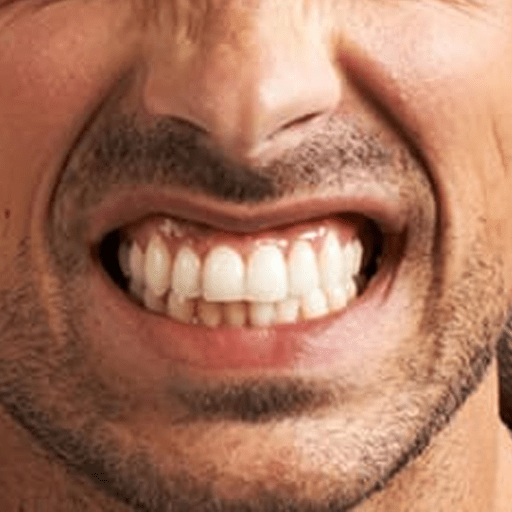Teeth Grinding
Learn more about the side-effects of grinding your teeth and how we treat it at Envisage Dental



Bruxing
When people have the following complaints:
- headaches on waking up
- sore or tight jaws on waking up
- neck pains on waking up
- teeth are sensitive to chew on
- teeth chipped easily
- teeth severely worn down to stumps
- partner complains of interrupted sleep caused by the gritting noise
- perfectly good teeth cracked overnight
dentists will normally give the diagnosis that these people are grinding their teeth (bruxing) and/or clenching their teeth during sleep.
Bruxing is the habit of unconsciously gritting or grinding the teeth, especially in situations of stress or during sleep. While bruxing, the lower jaw moves side-to-side and/or back and forth while the upper and lower teeth are in contact.
Clenching is the habit of clamping the teeth together firmly and tightening the jaw muscles, without moving the lower jaw sideways or back and forth.
Why do people clench their teeth during sleep?
The actual cause of grinding or clenching remains unknown. Recent studies have shown that grinding and clenching of teeth may be related to obstructed airways during sleep. This obstruction may be caused by ablocked nose, so the throat muscles intermittently relax and block the airway during sleep. When your airway is blocked, your body will start an emergency rescue mission by getting you to clench to raise the hyoid bone and open the airway, or bruxing to move the mandible out of the airway along with the tongue and open up the airway.
How do I know if I'm grinding my teeth?
If you often wake up with a dull headache, stiff or sore jaws, neck pains, and if you loved ones are complaining about the noise you make during your sleep, you are most likely grinding your teeth. Alternatively, if you tend to chip your teeth even when you are just eating something soft, and if your teeth are becoming shorter and unsightly, this is another sign that you are likely grinding your teeth.
How do I stop myself from grinding my teeth during sleep?
Most people are not aware of the grinding if they do not have the symptoms of headaches, sore jaws, and neck pains. They may just receive complaints from family members that their sleep is interrupted by the noise of grinding and gritting. This can affect personal relationships even if these people do not present any physical symptoms of grinding.
You cannot stop yourself grinding during sleep. Grinding during sleep can be a protective mechanism that your body has to keep you breathing and staying alive!
However, your dentist can custom make a night guard (an occlusal splint) for you to wear to protect your teeth from further damage and to give your loved ones a good night’s sleep.
Is it uncomfortable to sleep wearing a night guard?
You will need to take some time to get used to the night guard. The first thing that most people complain about wearing the night guard is the uncontrollable amount of saliva. As soon as you put the night guard into your mouth, your body takes it as food and will initiate the salivary flow to start the digestive process. However, our smart body quickly learns that the night guard is there to stay and will get the salivary flow back to normal rate. All you need to do is persevere and you will be able to wear the night guard to sleep.
In the first days of wearing the night guard, you may wake up with worse headaches, sore jaws and neck pains. Your teeth may also feel weird and tender. Persevere and all these will pass. If these problems do not subside after 2 weeks, you will need to see your dentist for some adjustments to the night guard.
What are night guards/occlusal splints made of?
Occlusal splints are made of either hard acrylic or soft material like a mouth guard. Your dentist will need to take an impression of your teeth to make the occlusal splints.
